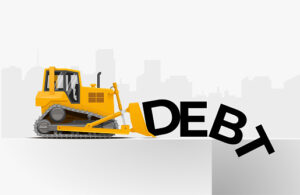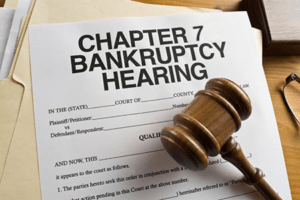Table of Contents
Chapter 7 Bankruptcy – The Ultimate Guide
What is Chapter 7 bankruptcy? Glad you asked. It’s for someone who can’t repay their debts, because their income is low enough that they can’t afford to. However, not everyone qualifies for this out of the different chapters of bankruptcy, and even if you did qualify for Chapter 7 bankruptcy, you could lose assets. There’s always some element of risk in a Chapter 7, which is why I put together this: the ultimate Chapter 7 bankruptcy guide.
This guide was written in an attempt to be an ultimate Chapter 7 bankruptcy guide. There are a few on the internet, but this one was written by Los Angeles bankruptcy attorney Hale Antico.
I try to use plain language and not talk over your head. I prefer to take something complicated like bankruptcy law and explain it in simple terms. And that’s what I try to do here.
Easy-to-Understand
I would describe Chapter 7 bankruptcy as being like a bulldozer of debt. One that shoves all your credit cards and other unsecured debt into a garbage dump.

Or I may try to explain Chapter 7 as a car wash. You know the kind: a car wash where you drive your car through it. It gets rid of most if not all the common dirt like credit card debt. Once you come out the other side, it’s pretty clean, much of the dirt is gone. But there’s always that road tar on or near the bottom of the car that’s still there. The gunk that the car wash can’t get rid of. In my analogy, usually bankruptcy doesn’t clean off the student loan debt, tax debt, and credit card fraud like recent usage. That’s the gunk. But for someone with a lot of common dirt they’ll never be able to wash off (or pay back), the car wash can be very effective and efficient.
Compare this Chapter 7 bankruptcy guide with other lawyer websites. Most use the same jargon words and really don’t tell you anything. What they tell you is that the bankruptcy lawyers didn’t write it, the website creator did. And whichever one did write it just used someone else’s generic Chapter 7 description. They copy-paste each other and it’s all the same boring drab, none of it that makes sense, all of it boring and confusing.
Which is why you see lots of definitions like:
Chapter 7 bankruptcy involves liquidation of unexempted assets of an insolvent debtor by discharging unsecured nonpriority debts if debtor qualifies by passing the post-BAPCPA means test and is administered by the bankruptcy trustee for the benefit of the creditors before discharge.
There. What did you learn from that? You learned that the lawyer can’t really explain things to you, doesn’t want to bother speaking to you in terms you understand, or just farmed out the website content to a kid at the website creation company.
Now, I’ll take the same concept and put in terms that make more sense:
Chapter 7 bankruptcy is for someone who owes debt with no collateral but can’t afford to pay any of it back so can get rid of it all, but also can lose stuff beyond what’s allowed to be protected.
Isn’t that much better? That’s why, given the choice, you’ll want to retain the services of the bankruptcy attorney who wrote this Chapter 7 bankruptcy guide and everything on this website. Just fill out a contact form.
Comprehensive
The Chapter 7 bankruptcy guide also tries to be comprehensive. Which is why you’ll want to bookmark it and link to it. It can’t list every possible thing that happens or could ever happen in a Chapter 7 bankruptcy case. But it does list most things that one should consider before making the serious (and hopefully once-in-a-lifetime) decision to declare bankruptcy. And don’t forget to read my list of 12 crucial things to do (and avoid doing) before filing bankruptcy.
Do I Qualify for Chapter 7 Bankruptcy

Chapter 7 bankruptcy stops all collections and is for people who really don’t have any way to make any payments on their debts. To level the playing field, they made it so you can’t earn a lot of money and just say you spend it all on household needs.
One rule to qualify for Chapter 7 is to earn under the median income in your state. In California after 2020, the median income is over $60,000 annually for a one-person household. So Californians earning less money than that a year will have an easier time to file Chapter 7 bankruptcy.
The Bankruptcy Means Test to file Chapter 7
However, Congress added a long complicated form to be the guard dog for who gets into Chapter 7. This is called the Means Test. Think of a 15-page tax return, and you have a pretty good idea what it’s like to fill out. The general gist of it is this: if you don’t earn less than the median income, only certain household expenses are “allowable.”
If you spend things for things not on the form, it’s presumed unreasonable and you probably could have extra money for repaying your debt. Consequently, this form is a combination of what you really spend money on and “allowances” and standard deductions.
Learn more about the Means Test.
Alternative to the Means Test
Even if you don’t qualify for Chapter 7, you can still likely do Chapter 13 bankruptcy, where interest is frozen, no one can sue you, and you make payments on your debt.
Will I Ever Get Credit Again?
Bankruptcy hurts your credit. It’ll appear on your credit report for up to ten years after you file. Credit agencies report credit histories accurately, good or bad, for seven years. Bankruptcy is different; Experian , Equifax and Trans Union report them for a longer duration.
However, according to former clients, this is usually not as big a problem as most people think. Credit lending agencies know you won’t be able to file another bankruptcy for up to 8 years, and therefore, they don’t have that risk to bear.
You will not get as high a credit limit as you once had, or be able to borrow a large sum of money. But getting some credit (such as a secured credit card) shouldn’t be that difficult. You can then rebuild your credit over time. What you will likely face is higher interest rates, required higher down payments, more points, etc.
Some people do have difficulty rebuilding their credit, but it is usually due to other factors besides bankruptcy, such as their employment record, other credit problems, etc. In any event, we can provide you with excellent materials for helping you rebuild your credit should you so desire.
Learn more about credit after bankruptcy.
Chapter 7 bankruptcy is all about the budget
People are often surprised when we sit down to go over their finances sometimes that I’m more interested in their budget than their debts. Yes, the creditor information is important, and we will get into that a little later. However, once I get a feel for the household budget, I can get a sense in which direction our conversation will go.
Consequently, I’m going to try to understand whether you can afford all your basics each month. Forget the debt… can you keep the lights on, put food on the table, and pay the rent? Because let’s face it: if you’re struggling just to make ends meet, then the debt isn’t the problem, but a symptom. The true problem is negative cash flow.
Not enough to income to cover basic expenses

Because there’s not enough money to pay the rent, borrowing helps keeps things afloat.
That’s why it’s the symptom, pointing to the real root cause: budget shortfall. Even if the credit cards were torn up tomorrow all the debt forgiven, next month, there’s still going to be not enough money.
The solution here isn’t to file bankruptcy, though that may not be a bad idea. The fix is to increase income or to cut expenses. First, to increase income, get a second job, a roommate to pay rent, etc will increase income.
To reduce expenses, consider cutting back on satellite or cable, cell phone plans, gym or storage rent, etc. Sometimes the solution is as obvious as getting rid of that monthly vehicle payment on the thing you really don’t need, despite your emotional attachment to it.
Covering the bills, but not the debts
Secondly, maybe you’re able to pay your monthly expenses and all the typical bills. It’s just the darn credit card debts you can’t get to. That is, you have like nothing to give them at all, it all goes to keeping the lights on. If that’s the case, and your income is low enough to pass the means test, then maybe a good solution for you to consider is Chapter 7 bankruptcy.
Because then you can keep your household expenses covered, and an experienced Chapter 7 attorney can get rid of the credit card debt.
A Budget Surplus!
Finally, maybe you can pay all the monthly bills, and you have some money left, but you just don’t have enough to pay all the credit card minimum payments. Or maybe you can, but you’ll be paying interest forever. But either way, you have some money left for a debt repayment, and have even thought about debt consolidation. Chances are, this is not a Chapter 7 bankruptcy situation.
So, you can see, by asking about the budget, it really helps a Los Angeles bankruptcy lawyer get a feel for what kind of pressures you’re feeling, sort of walk in your shoes for a moment. But in addition, it helps focus the conversation on if Chapter 7 bankruptcy will help you, or if you should consider other options.
Losing Stuff in Chapter 7 Bankruptcy
One major concern of many people is whether they have to give back any of their possessions if they file bankruptcy. The answer is that it depends on how much “stuff” you have. However, if you’re like many people, you don’t own much, have no real estate or other major things.
But this is where good planning and completing the proper exemptions comes in. It’s quite possible that harassing creditors won’t be able to get their hands on your stereo, your CD collection or, since you’re viewing this on the web, your computer. We can likely make it so you give nothing back. You’ll probably keep all your assets.
Note: if you transferred or gave away anything valuable in the last four years (or possibly longer!) for less than it was worth, you may have a fraudulent transfer problem.
California Bankruptcy Exemptions and Exempting Property
Maybe you’ve already asked yourself, should I file bankruptcy, and after reading that article, think you want to. You’ve read up on Chapter 7 bankruptcy here, and next will want a skilled experienced Los Angeles bankruptcy attorney to run the bankruptcy means test. But before we go that far, can you lose things in bankruptcy? The answer is, “yes.” Will you? It depends.
Grossly oversimplifying for a moment, there are two systems you can choose from for the California bankruptcy exemptions. It’s like a Chinese restaurant, you can order off the Emperor Meal or the Dragon Dinner. You can’t mix or match. You are ordering off of either one or the other menu. The sign behind the cash register says, “NO SUBSTITUTIONS!”
Pick a Menu
One California bankruptcy exemption menu might have a wild card exemption and goodies like “protecting lots of cash and paid-off cars.” (Update: it’s now more). The other menu has delicacies like maybe “protecting a lot of home equity with the California homestead exemption.” (but beware of the new 1215-day rule)
You tell your Chapter 7 bankruptcy trustee you’d like to have both please. They point to the sign behind the register. This is how people lose their tax refund in a Chapter 7 bankruptcy when they also have home equity.
This is just one example of many that comes up again and again. And we didn’t even get into which state’s exemptions to use if the debtor moved or is moving states. You’ll want to sit down and talk to a Los Angeles bankruptcy lawyer. If a paralegal or anyone else without a license answers your California bankruptcy exemption question, they’re practicing law without a license, and you should run away.
I Qualify for Chapter 7 Bankruptcy, but Should I File
Maybe you’ve read this far, and you’ve concluded that you are eligible for Chapter 7 bankruptcy, but should you file Chapter 7? That’s a whole different question. And probably one beyond the scope of a website. For should questions, you probably want to talk to an experienced Los Angeles bankruptcy attorney.
To determine whether you should file, a skilled counselor will look at your whole financial picture. That’s why our bankruptcy questionnaires are often so detailed. “Why do you need to know so much; just tell me what I should do!”
Yes, but to tell you which is your best option, a good bankruptcy lawyer will want to know about your budget, your job prospects, income-earning potential. Your assets, and equity you have. Any money out there you can collect, or people trying to collect against you with court cases. There’s a lot that needs to be considered before a licensed professional tells someone what they should do.
Should I Get my Appendix Removed? And What’s the Cost
People call asking “should I file bankruptcy” and “what’s a bankruptcy cost” and I want to help them but sometimes a responsible bankruptcy attorney just doesn’t have an answer without fully understanding the situation. It’s like calling a doctor and saying on the phone, “I have a stomach ache should I get cut open and have my appendix taken out?”
What would you say to a medical professional that answered that question on the phone? That they’re probably an unqualified quack. They’d want you to come in to the office, examine you, have you fill out paperwork to learn your medical history, and ask questions about things more recent. And you’d probably happily go along with all that because you’ll be getting help.
That’s the same approach that helps an attorney understand what you should do. Because instead of appendicitis, it’s possible you just ate some bad pizza and don’t need surgery but a mild antacid.
How Much Does it Cost to File Bankruptcy
No One-Size-Fits-All
Cost is a similar question. “How much does it cost to file bankruptcy?” Heck if I know. Another analogy. Call up a carpet cleaner, and ask them on the phone what does it cost to shampoo a house, without any other questions. If they gave you a price, they’re either dumb or dishonest.
They’re dumb if they didn’t think you might have a huge mansion and they quoted you for a small bedroom because they didn’t ask. They’re dishonest if they know you might have a mansion, but gave you the low price anyway figuring they’ll just jack it up once it’s too late.
No smart or honest business owner quotes their services unless they know how big (or small) the job is. Someone that does is either dumb or dishonest, and do you really want either one to be your bankruptcy attorney?
So, how much does it cost to file bankruptcy? A responsible Los Angeles bankruptcy lawyer will want information, to ask questions, to understand what the entire situation is. Then, they’ll give you a price that is flat, set and doesn’t go up.
You want an honest attorney who tries to learn and understand you, and your unique circumstances. Not a shifty carpet cleaner bait-and-switch. Contact us and let’s have a conversation. We’ll be honest with you.
What about Discrimination by my Employer or the Government?
You are protected against your job firing you or the federal government not giving you a student loan, etc. Your rights are all spelled out in 11 USC 525. But beware: just because you can get more debt after bankruptcy doesn’t mean you should.
Is there a debt limit to Chapter 7?
One question people ask this bankruptcy lawyer is, “How much do you have to be in debt to file Chapter 7.” There is no debt limit to Chapter 7 bankruptcy. It just becomes a matter of practicality. For example, you wouldn’t file bankruptcy for a debt of $100. What about $1,000? $10,000? $100,000? At some point, filing bankruptcy just makes sense. And for each person, that line is drawn differently.
There seems to be an upper limit that will get you on the trustee’s radar, though it’s not sure exactly what that number is. Good faith and fraud can be factors with a lot of debt. Generally, unlike Chapter 13 bankruptcy, there’s no limit to how much debt you can have in Chapter 7. if it’s reasonable it should work, though your mileage may vary.
Reaffirmation Agreement in Chapter 7
If you file bankruptcy Chapter 7, a creditor may try to stick you with debt that lasts after the bankruptcy is over. This obviously goes against the purpose of bankruptcy, and is, of course, bad. The hitch is: sometimes you need to sign them. This is a Chapter 7 reaffirmation agreement, and you’ll want to read up on them before signing. Why? Because it can have consequences years after the bankruptcy. 2022 update: With the new Calif SB1099 law, it looks like ride-through in California bankruptcy is back.
Do I Need a Lawyer for a “Simple” Bankruptcy?
Legally, you can file bankruptcy without an attorney. It’s just forms, right? Dozens and dozens of pages to fill out, with decisions on each one. Only a lawyer can give you legal advice, and only an attorney can practice law. Paralegals can’t take your papers to court for you, or more importantly, show up at court with you. No one but lawyers can fight a creditor if they contend any part of your case.
Hidden Costs and Dangers of Bankruptcy Paralegals
You may save a few hundred dollars on a bankruptcy paralegal, but they can’t do any of the above. You do everything else… alone. Because paralegals aren’t licensed and have no oversight, their mistakes can cost you thousands of dollars.
We’ve seen things like overlooked equity in your car where you’re forced to sell it — there is nothing you can do. Or they charge you hundreds of dollars more to try to fix it. By the time all the fixes are in, you’ve paid more than for a good bankruptcy attorney, and gotten far worse quality.
This literally happened with someone who got taken by a paralegal for a “cheap bankruptcy.” By the time the client had to pay for all the amendments and fixes, it was more than bankruptcy attorneys would’ve charged. Don’t take a chance and cut corners with a legal process as important as this one which impacts your financial affairs, your money, car and future. You get what you pay for.
A Chapter 7 Bankruptcy Can Get You a Fresh Start
You’ll want a skilled bankruptcy attorney to help you with this, particularly if you’re in California. The Chapter 7 California bankruptcy exemptions in California are different than most states, and good Los Angeles bankruptcy lawyers can help protect most (if not all) of your assets for you.
So remember, the difference between this and Chapter 13 is that you don’t make payments on your debt. Discharging your debt with nothing to your creditors is the essence of a Chapter 7 bankruptcy.
The 341(a) Meeting of Creditors
A big part of a Chapter 7 bankruptcy is the 341(a) Meeting of Creditors. Note that after the pandemic, these are very frequently remote 341(a) meetings, and read that to understand what to expect at Zoom or phone hearings. But regardless, yes, 341a. That’s more jargon, but that’s what it’s called. The 341 is from the section of the bankruptcy code. The Meeting of Creditors is really a bad name for it. Why?
What it’s not.

Firstly, it’s not a meeting. There’s not a boardroom where you sit down under a portrait of the founder of Chase Bank. Meetings involve two-way conversations and aren’t under oath. it’s an interrogation. But more on that later.
Secondly, it’s likely not going to involve a bunch of creditors in attendance. Creditors don’t often attend the 341(a) Meeting because they don’t have to. Sending a bankruptcy lawyer to court costs money, and even creditors have a budget.
If a creditor does have a problem with your bankruptcy case, they’ll draft a document from the comforts of their office. Then they’ll file it with the court. There are many reasons a creditor would challenge your bankruptcy, but one common challenge is because you used the credit cards recently, which would be fraud.
Who will be there is a bankruptcy trustee, and you’ll be under oath. And signs from the FBI. And a recording device. This is where you don’t want to be alone (and a paralegal can’t sit with you). This is definitely where you want to have a skilled Chapter 7 bankruptcy lawyer with you.
Thirdly, the Meeting of Creditors should be called Interrogation by the Trustee, but that sounds less friendly. The trustee will swear you in under oath, verify your identity, establish that you actually signed these documents and understand what they all say. And last chance: are there any errors, omissions, or changes you want to bring to my attention at this time? No? Ok. And then the actual questions start.
Don’t testify alone
In the Central District of California, where Los Angeles bankruptcy cases are filed, if you have a bankruptcy attorney help you with your case, a bankruptcy lawyer has to attend the Meeting of Creditors with you. Most send a stranger you’ve never met. This Los Angeles bankruptcy attorney personally attends most if not all his clients’ 341a meetings. And you’ll be prepared for it.
Contact Us – We’re qualified, and affordable
We’ve successfully helped thousands of Los Angeles bankruptcy seekers file Chapter 7 bankruptcy. We have a flexible payment plan. We actually strive to have good customer service, which is why I typed all this bankruptcy information to help people. And we’re affordable.
Drop a line and let’s have a no-pressure consultation, and start getting some peace of mind, some hope, and let’s start working on your fresh start.
Let a skilled Los Angeles bankruptcy lawyer be your guide on your Chapter 7.





